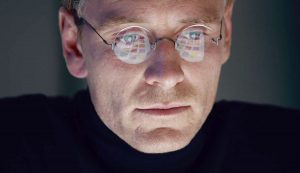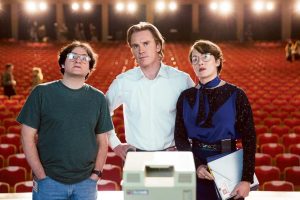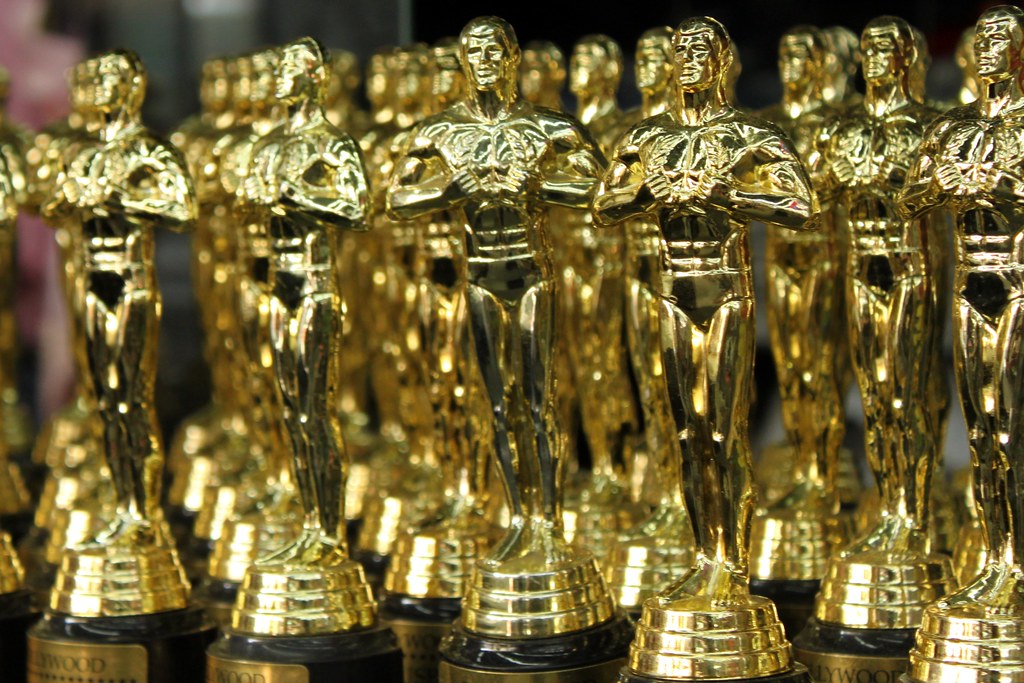Taking the audience backstage before three major product launches, “Steve Jobs” reveals the harsh interactions and struggling relationships between the legendary man who changed the future and the co-workers who walked in his shadow.
Michael Fassbender excels at playing the formidable Steve Jobs, but it is really the supporting actors who carry the movie––Kate Winslet plays his defiant, Polish “work wife” and Michael Stuhlbarg plays the nerdy, heartfelt genius Andy Hertzfeld. Seth Rogen is fantastic as the affable Apple co-founder Steve Wozniak and plays this serious role better than his signature comedic ones.

All the action, rather unrealistically, takes place in the moments leading up to a product unveiling––as described by a frustrated Jobs in the movie, “Five minutes before every launch people get drunk and tell me what’s wrong with me.” The film, which moves at an uneven, hectic pace, offers an entertaining and at times excessively contrived, up-close portrait of Jobs; highly dramatized frantic snippets reveal the motives behind his actions and aspects of his personality: perfectionism and narcissism.
“Steve Jobs” is directed by Danny Boyle with a clean, sleek precision reminiscent of Apple’s signature design. The screenplay, by Aaron Sorkin, is charged with entertaining, snappy dialogue, although the story takes more than a few liberties with the facts of Jobs’ life. The movie is very loosely based on Walter Isaacson’s biography of the icon, but on screen, factual accuracy seems to be of little concern, as most of the conversations between Jobs and his employees reveal his character rather than an accurate record of events.
The film documents Jobs’ leadership during Apple’s digital revolution and explores his relationship with his daughter, Lisa, whom at first he adamantly denies is his, even after a positive paternity test.
He prolongs a sadistic connection with his ex-girlfriend (played by a tearful, but talented Katherine Waterston) at the expense of having any relationship with Lisa. Only in the very last minutes of the movie does Jobs desperately attempt to mend his hurtful actions of the past. Finally the audience’s patience is rewarded when viewers witness Jobs’ compassion soften his cold exterior. Although this scene is appealing for sentimental reasons, it feels like a last-ditch effort by the movie’s creators to imbue Jobs with a shred of humanity and it comes off as too little, too late, further emphasizing how unrealistically fast their conflicted relationship is resolved.
The film is separated into three 40-minute sections, beginning with the 1984 Macintosh launch, moving on to the unveiling of the absurdly priced NeXTcube in 1988, and finishing off a decade later with the highly-anticipated release of the iMac; the audience sees Jobs transition from a bowtie-touting, long-haired man to the familiar black turtleneck-clad icon.

Through the three different chapters, the film emphasizes Jobs’ flaws, at times portraying his genius as a curse to those around him, but also as the propelling force behind the creation of revolutionary technology. As his workers struggle to meet his perfectionistic demands, Jobs relishes criticizing them with witty derision. He has no misgivings about attacking his workers personally and he appears to be comfortable with constant discord. The acting and dialogue so skillfully capture Jobs’ unappealing personality that viewers may find themselves disliking the film when in fact they are simply responding to the character revealed.
His vindictive nature is on full display during the second segment. By this time, Jobs has been fired from Apple, kicked off the board, and is in sore need of a comeback after the Macintosh flop. However, an empire needs its emperor (Apple is suffering in the absence of its co-creator) and through the NeXTcube’s software, Jobs sets into motion the machinations to ensure his reinstatement at the company. In one of the most compelling scenes, Jobs’ strategy is revealed in a manner that allows the audience to see through a window into his mind and view what an unemotional, calculating place it can be.
While the endearing character of Wozniak balances Jobs’ malice, Winslet’s Joanna Hoffman acts as his caretaker and coaxes out his hidden sliver of humanity, although the audience may question its existence.
Perhaps the most clever aspect of the movie was the idea to shoot each of the three segments in a different format: glossy polished digital for the launch of the iMac, the unveiling of the NeXT cube in classic and clean 35mm, and the Macintosh release in slightly grainy 16mm.
As Wozniak pleads with Jobs to acknowledge the Apple II computer team at his latest launch, Jobs refuses with stubborn steadfastness, prompting Wozniak to declare, “You can be decent and gifted at the same time.”
One question lingers after the credits scroll by. If Steve Jobs were decent, or at least more so, would he be as interesting? As much a genius? As legendary?









